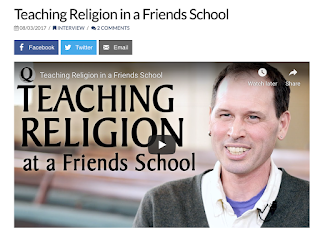We began with the big query of Friends Schools. We considered the why, when, how of a Quaker education using these resources:
Teaching Religion at a Friends School, Tom Hoopes, QuakerSpeak, 08/03/17
Quaker Schools / Friends Schools: Quakers in the World
http://www.quakersintheworld.org/quakers-in-action/66/-Quaker-SchoolsFriends-SchoolsQuaker Schools: Strong Model Minority, Charles Austin, NewYorkTimes, 11/13/83
Quaker Education : What's Different about a Friends School? Drew Smith, Friends Council on Education, 7/26/17
Quaker Indian Boarding Schools, Friends Journal, Paula Palmer 10/01/16
https://www.friendsjournal.org/quaker-indian-boarding-schools/
Our conversation was loosely structured using the following prompts:
- What are you noticing/feeling/thinking?
- What in these ideas feels familiar or expected?
- What in these ideas feels surprising or unfamiliar?
- What questions do you have?
Our reflections inspired some queries...
How does the multiplicity within each of us "speak" to our role in our community? Multiplicity meaning the varied ways we might identify... individuals who might be both Jewish and Christian, for example. This becomes important especially as we think about the identities of the learners in the room - we are used to the multiple identities and perspectives in the group, how about those within each of us as individuals?
How do we remember that we are "stumbling" forward? What does that mean? Why might it resonate? (Quote from Tom Hoopes, Quaker Speak)
Does the Quaker ethos in our rooms build because of the type of learners that we admit, or are the learners that we admit shaped by the Quaker ethos in the room? What might that mean for our teaching and learning practice?
Who are we today? How has the past shaped our ideas and opinions? What might people of the future feel shock or dismay to learn about our practices today? How do we examine our own leadings to let the light shine?









No comments:
Post a Comment